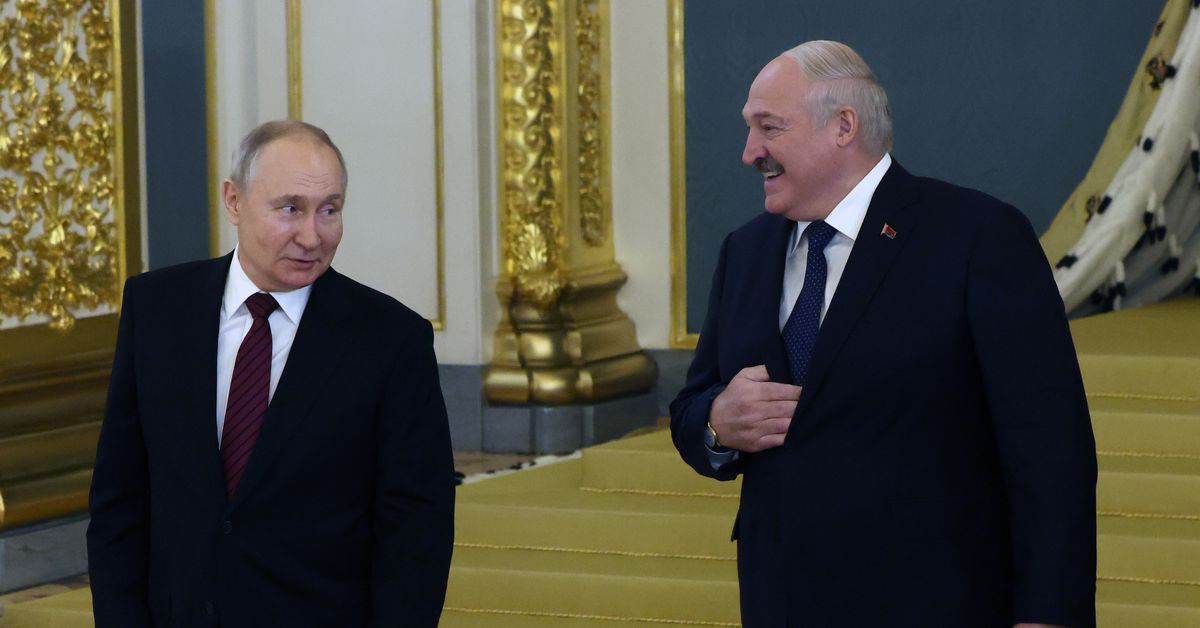Belarusian President Aleksandr Lukashenko has taken credit for brokering a deal between his Russian counterpart Vladimir Putin and Wagner military group leader Yevgeny Prigozhin, heading off what appeared to be an armed mutiny headed toward Moscow Saturday.
On Friday, Prigozhin made the unverified claim that his mercenary forces had been attacked by the Russian military, using that as a pretext to launch an armed march on Moscow. They ultimately came within 200 kilometers of the city before he ordered his troops to return to their camps to avoid spilling “Russian blood” under the terms of the agreement Lukashenko announced.
Details about that agreement are scant, but the Russian state’s criminal investigation against Prigozhin was supposedly dropped (though that’s less clear as of Monday), his troops retreated from their “march for justice,” and he will now live in seeming exile in Belarus. “The president of Belarus informed the president of Russia in detail about the results of negotiations with the leadership of Wagner PMC [private military company],” Lukashenko’s office said in a statement. “The president of Russia supported and thanked his Belarusian counterpart for the work done.”
Though the Kremlin has confirmed the deal and says it was the result of Lukashenko’s “personal initiative,” the precise contours of his involvement still aren’t independently confirmed. Analysts doubt that Lukashenko was indeed a key broker of the deal, but he may have gotten involved to ensure his own survival, which is likely tied to Putin’s, and in an attempt to win influence over the Kremlin. But unconfirmed reports from Russian state media also indicate that the investigation of Prigozhin may be ongoing, and Prigozhin’s whereabouts remain unknown, suggesting that there may be more to the deal than has been stated publicly — or it might be more fragile than stated.
But it’s nevertheless a moment in the spotlight for Lukashenko, a dictator shunned by the international community and one of Putin’s closest allies.
Here’s what we know about Lukashenko, his relationship with Putin, and why he might have been involved in this deal. How did Aleksandr Lukashenko become president of Belarus?
Lukashenko has been at the helm ever since the country held its first presidential elections in 1994 after it declared independence from the Soviet Union. That’s despite mass protests that broke out after fraudulent elections in 2020 in which he claimed to have won 80 percent of the vote.
The US has cited “severe restrictions on ballot access for candidates, prohibition of local independent observers at polling stations, intimidation tactics employed against opposition candidates, and the detentions of peaceful protesters and journalists” as evidence that the election was neither free nor fair.
Those protests were violently quashed. Tens of thousands of Belarusians have been imprisoned for expressing their political views in the years since. At least 100,000 have been forced to flee, according to the United Nations. The state continues to crack down on the press for reporting on the regime, with Radio Free Europe/Radio Liberty journalist Ihar Losik and Belsat journalist Katsiaryna Andreyeva facing harsh prison sentences. And it has targeted Belarusian public figures abroad who are critical of the regime, including Olympic athletes and activist Roman Protasevich.
The Biden administration has since imposed multiple rounds of economic sanctions against Belarus that have been extended through 2024. The White House has targeted Belarusian companies that profit from the government, those involved in the crackdown on the post-election protests, and those involved in forcing the landing of a Ryanair flight carrying Protasevich, who was later detained in Belarus. Lukashenko’s complicated relationship with Putin
Lukashenko was first elected after promising to establish closer ties with Russia, and, unlike neighboring former Soviet states including Latvia and Lithuania, Belarus never joined NATO.
But under his leadership, Belarus’s relationship with Russia has oscillated from tense to codependent. They’ve been at times embroiled in trade wars, and after Russia illegally annexed Crimea in 2014, Lukashenko reportedly feared that Belarus could be next as Putin publicly entertained the idea of a political union with the country.
Then, during the mass protests in 2020, Russia stepped in and helped prop up Lukashenko with military and economic support. Russia reportedly supplied weapons to Lukashenko’s government amid the crackdown on protesters. It also provided $1.5 billion in loans to Belarus, guaranteed low gas prices, and deferred the country’s debt payments. That was critical given the pandemic-related recession in Belarus, the economic turbulence caused by the protests, and the country’s inability to seek Western financing. In exchange, Lukashenko agreed to form a “union state with Russia” — essentially, moving toward economic integration and backing the Putin regime on political and military matters (though so far refraining from putting Belarusian troops on the ground in Ukraine).
Belarus remains more dependent than ever on Russian economic support now that it’s the object of international sanctions. That has made Lukashenko into a puppet of Putin and a key partner in his war in Ukraine, given that it shares 700 miles of border with Belarus.
Belarus was also one of the launchpads for Putin’s initial invasion of Ukraine in February 2022. Russian missiles have been fired from Belarus. Injured Russian soldiers have been sent to Belarus for medical treatment. Lukashenko has agreed to store Russian nuclear weapons on his country’s soil. And Belarus is accused of helping Russia forcibly displace Ukrainian children from Russian-occupied territory.
Lukashenko’s involvement in negotiating the deal with Prigozhin (or his efforts to at least take credit for it) might be an attempt to win some leverage with Putin and be seen as a statesman in his own right.
“It has clearly changed the relations between Lukashenko and the Kremlin, because after 2020 he became a kind of a puppet for the Russian authorities. He was treated as someone who was not equal,” Ryhor Astapenia, director of the Belarus initiative at the Chatham House think tank, told the Guardian. “Now you can say he’s one of the winners of this failed coup and it will restore some of his agency in his relations with Russia, at least in the near future.”
But for now, Lukashenko’s fate remains inextricably tied to Putin’s. And it remains to be seen whether Prigozhin’s brief mutiny will deal a lasting blow to Putin’s grip on power.
I do wonder (given the weird and largely bloodless development of the 'march for justice’and it’s current state with Prighozin and some Wagner said to be going to Belorussia) whether that is all a play for public consumption. It wouldn’t be the first time Putin has staged dramatic and public events to achieve his ends.
A worrying evolution consistent with the rumours would be Prighozin as Lukashenko’s head of “Security”, but aligned with Putin, plus a reconstituted Wagner threatening Ukraine’s northern border.
That sounds like a huge win for Putin compared to the current situation.
Maybe that’s crazy, I hope so.
Great achievement for him, way to go Lushashenko! Too many people here were hoping for a bloodbath, in the name of God! Amen!




